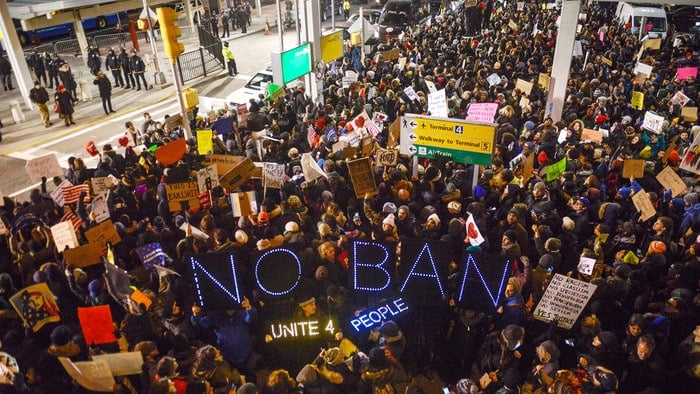
Thousands gathered at JFK airport in New York City in protest of people detained under Trump’s executive order. (Stephanie Keith/Getty)
Despite the frenzy over the recent controversial immigration policies, delegitimizing America and its institutions—the presidency, the media, and the political process—has been going on for decades, and is worsening.
In recent days, both the left and right have accused their opponents’ supporters in the media as being increasingly illegitimate.
Conservative radio talk shows attacked television and newspapers in the “mainstream media” as being deceitful and partisan. The left responded with identical counterclaims against conservative radio. A cable vs cable debate followed, where Fox News took on the role of defender of conservative values against CNN and MSNBC. The left responded that their critics were the irrational ones. As blogs and other forms of social media developed, people increasingly drew their news from sources that reflected their own political opinions, and their Twitter and Facebook feeds became siloed echo chambers.
During the 2016 presidential campaign, “fake news” became the allegation du jour. Some fake news was clickbait allegedly generated from the Balkans merely for profit-making. But other partisan sites, and sometimes mainstream sites, were assailed as fake news also. Candidate Trump was frequently seen to be careless, hyperbolic, or deliberately deceitful, with a professed disdain for the media. In the first days of the new Trump administration, White House spokesperson Sean Spicer and key counselor Kellyanne Conway seemed to elevate the use of “alternative facts” in their official roles.
Attacks on the legitimacy of other American institutions continue as well. Debating the legitimacy of education goes back at least to 1955’s Why Johnny Can’t Read, through de-segregation and bussing, Lean On Me‘s urban decay, charter schools, blind hostility to or embrace of teachers unions, and universities as lounges for left-wing radicals and their young acolytes.
Despite the “thank you for your service” gestures today, the military has been criticized (sometimes rightly) for its military-industrial complex and overpriced contracting, abuses in Vietnam and Abu Ghraib, as well as the drones strategy. The intelligence community has been delegitimized for missing 9/11 but seeing Iraqi WMD, massive domestic surveillance programs, and recent criticisms by candidate Trump. American industries—agriculture, pharmaceutical, finance, energy, to name a few—have also come under a long train of attacks.
This weekend’s immigration fiasco, based on the President’s executive order, “Protecting the Nation from Foreign Terrorist Entry into the United States,” was the next stage of delegitimizing the American political process itself.
Previous presidents have made significant achievements with an opposition Congress. President Reagan signed laws on tax cuts and immigration reform (including amnesty for three million) with a Democratic House. President George H.W. Bush signed the Americans with 1990 Disabilities Act with a Democratic House and Senate. President Clinton managed tax cuts, immigration reform, and the creation of the Children’s Health Insurance Program (CHIP) as part of the Balanced Budget Act, all with a Republican House and Senate. President George W. Bush signed a major education reform bill with a Democratic Senate.
For a variety of reasons—depending on one’s perspectives, an absolutely obstinate Republican Congress or a lack of skill or will to build bipartisan consensus—some of President Obama’s largest achievements came without Republican support. Not a single Republican Senator voted in favor of the Affordable Care Act, for example.
Obama came to rely on the executive prerogative to implement major policies. Obama created the Deferred Action for Childhood Arrivals (DACA) when he could not get the DREAM Act and comprehensive immigration reform through Congress. He signed the Paris climate accord and the Iran nuclear deal without submitting them to the Senate for treaty ratification.
In rapid succession, Trump has followed Obama’s example, even though his Republican party is in the majority in the House and Senate. On the Affordable Care Act, international trade, federal hiring, and other issues, he has not waited for the deliberative process of working with the Congress, executive branch departments, or outside experts.
The weekend’s so-called “Muslim ban,” the executive order on “Protecting the Nation from Foreign Terrorist Entry into the United States,” was controversial, misunderstood (and occasionally mischaracterized) in the mainstream and partisan media. But the policy was made worse by the seeming haste and carelessness with which it was promulgated: without the deliberation of the Congress, without careful input from terrorism or immigration experts, without consultation with allies, and without detailed instructions for the front-line personnel who were supposed to implement it in airports in the United States and abroad.
Opposition to the policy “went viral.” Protests and immigrant assistance efforts were broadcast globally by activists using social media, including the relatively new Facebook Live. Kathleen M. Vannucci, a prominent immigration attorney from Chicago, broadcast via Facebook Live to draw attention, activists, and media to O’Hare International Airport. Behind the scenes, people like Erin Kilroy Simpson, inspired by an expat friend, used social media to spread the call for Arabic, Kurdish, and Farsi translators to hustle to local airports to assist detained passengers.
This immigration restriction seemed to bring together the delegitimizing of American institutions—the presidency, the political process, and the media response. It built on decades of U.S. failure in the Middle East, withdrawal of global leadership, allegations of Russian influence in the election campaign, and a loss of faith in what news to believe. For America and President Trump to regain balance, progress, and legitimacy, they will have to undo not just what has happened since January 20th, but what the two parties have done to society and each other for more than 20 years. People like Vannucci and Simpson may provide some hope for the rest of us.